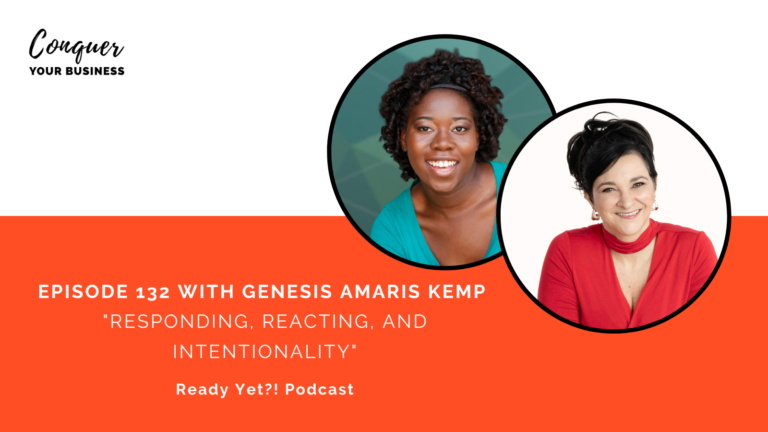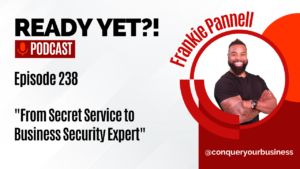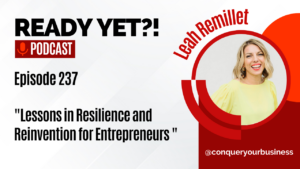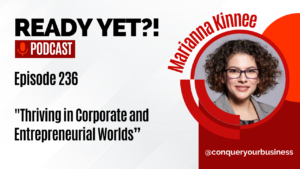RESPONDING, REACTING, AND INTENTIONALITY
As an entrepreneur, it’s so important to have the ability to be flexible with whatever the universe throws at you. As a new mom AND an entrepreneur, it’s even more important. My amazing guest today is Genesis Amaris Kemp, who wears many entrepreneurial hats and has recently welcomed her first child. Join us today as we discuss being intentional with your actions, responding vs. reacting, and how your business could use a visionary touch.
Resources
Transcript
Erin Marcus:
Hi! I’m Erin Marcus, former corporate executive turned entrepreneur and founder and CEO of Conquer Your Business. Welcome to the Ready Yet?! podcast. We’re excited to bring you more than a hundred episodes of interviews and insights designed to help entrepreneurs get the financial and emotional freedom they need in order to build a business and a life they’re proud of.
All right. Welcome to this episode of the Ready Yet?! podcast. Genesis and I have been chatting. We decided maybe we should hit record and loop you guys in. Oh my gosh, we’ve covered a wide range of topics from what do you do with your hair after you have a baby to the problems of having white skin and black hair and having to shave your legs to what do you do when you’re trying to redesign your entire life, and that was all before we hit record. So, I’m excited to loop everyone in but before we get back into our conversation and share this with everyone, why don’t you tell everybody a little bit more officially who you are and what you do?
Genesis Amaris Kemp:
Well, first and foremost, thank you so much, Erin for having me in your space. Everyone, I am Ms. Genesis Amaris Kemp, the firecracker, mindset hacker and visionary coach. I’m also the founder and host of GEMS podcast with Genesis Amaris Kemp. And I’ve had the pleasure to have Erin on my show and that was Ubers of fun. And outside of that, y’all, I am a mommy, a first-time mommy. I’m five months+ in the game. So, it has been a world win and definitely a rollercoaster ride. So, I’m rolling with the homies.
Erin Marcus:
Right? I mean, I do not have kids. However, I’d love to hear your take on this, I have watched so many women have so many great plans for what they were going to do and how they were going to do it and then have the baby. And like I know that when Eisenhower had this quote, he was talking about going to war. But I think the quote still applies where when going to war or when having a baby, the plans are irrelevant, but the planning process is very, very important, right? So, how has that been though as an entrepreneur and as someone juggling all this and the new mom situation?
Genesis Amaris Kemp:
So, it is definitely eventful. Let me tell you all first and foremost, like you can’t plan your day without including your baby, first and foremost. Because you’re on your baby schedule, not the other way around. Because there have been times where I’m like, ‘Okay. We’re going to do this, this, and this.’ And she’s like, ‘For real, mommy?’ No. And it’s always at the times where you’re like, ‘Okay. Come on, we got to get out of the house. We got to get here by there. And like you’re already strategically thinking about what you need to do and you’re like, ‘Okay. I put it in ways, ways says if I leave at this time, I can make it by this time. But then your baby decides to take a pee or your baby decides to have a blowout poop and then you’re like, ‘Really? Are you shitting me? You really just–
Erin Marcus:
Literally and figuratively, right? Literally. I think for entrepreneurs, not that this doesn’t happen for everybody, but entrepreneurs are so usually so driven. And it’s not that anyone welcomes those situations, but when I think about if there was a particular group that those types of situations, derailments of your plans and your goals, like how do you relearn how to grow your business now that you are less in control of what’s going on around you?
Genesis Amaris Kemp:
So, the one piece of advice that I’ve learned and that I would give to your audience is be flexible and be open. Like realize that not everything is going to go as you plan accordingly. However, if it does not go as you have initially planned, that does not mean the break-ins are bad. That those break-ins can very well be something that still catapults you to your rightful destination. You may just have to go from point A to point C in order to come back to point B, but then you learned a valuable lesson during that derailment. So, it’s like you have to see what is your focus and out of that focus, are these break-ins or are these derailments necessary bad or are they working for your good in the end, even though you may not see it right then and there? So, that’s one thing that helped me because I am a planner. I like to be strategic. I guess, it’s my background. I spent 12 years in oil and gas and I have a supply chain and logistics degree. So, I’m all about logistics.
Erin Marcus:
Ducks in a row, get in a row, stay in a row.
Genesis Amaris Kemp:
And I had to have like a doctor tell me, “This is not about you and your schedule. It’s about this little one in your schedule.” And she even asked me, “Are you an engineer?” And I’m like, “Why do all these freaking doctors keep asking me that?”
Erin Marcus:
Why do they know that?
Genesis Amaris Kemp:
I’m like, “I’m not an engineer.” And she’s like, “You are very Type A and you need to just take what you learn and to the side because it doesn’t work like that in motherhood.” And I’m so glad, like she gave it to me real off the cuff because now that I’m actually in it, I see it and I’m like, ‘Okay. Now, I realize what some moms go through.’ Because at first, I was like, ‘No ham, no cheese, no turkey.” Because that wasn’t my lifestyle but now it is. So, I get it.
Erin Marcus:
Well, and one of the things you’re describing, and it was a little bit about what we were chatting about before that I wanted to share with people is especially with what you do, not what you do for your clients and also how you handle your own world, is this idea of intentionality, right? This idea of intentionality. And intentionality does not mean this is my intention and I get what I want. It doesn’t mean outcome, right? But intentionality means to me it’s more like, what do I want to do in this instance so that I’m not reactive to the instance? And what you’re describing as the flexibility needed is what puts you back in intention, meaning not subject to reaction.
Genesis Amaris Kemp:
Yes, absolutely, Erin. And I’m glad you brought up that point because we literally just talked about this before we hit record. It’s like you have to kind of see what works best for you. And if you’re just reacting out of kneejerk response, how is that reaction? Is it helping you or is it hindering you? Is it making you better or is it making you bitter? Because you may react and then the consequences you get from that reaction may not be conducive to what you’re trying to accomplish or where you’re trying to go. But it was in the heat of the moment, it was in the spur of the moment and you’re like, ‘Okay. I got to get it done.’ But then you got it done, but you did it sloppy or you got it done but you hooked up with the wrong person or you got it done and you’re like, ‘I really don’t like this or I don’t appreciate it, or this is not what I was hoping for.’ But you were such in a hurry to get something done out of maybe the flight or fight response. Whereas if you would’ve just kind of taken a step back, let it simmer for a minute and say, ‘Okay. Is this the best decision for me in this current situation? And how is it going to help me after this situation has passed?’ And bring it into your vision, bring in clarity, bring in direction, bring in focus and put it all together. But we’re all human beings and we all react sometimes. But there’s been times where I’ve been like, “Ah, shitake mushroom, I should not have done that,” but the words came out, I had the full pause, or I already hit send on that message and you can’t delete it. Or I already hit swiped on that credit card and yeah, you can hit the return, but it’s still going to take three to five days
Erin Marcus:
Well, and what you’re talking about as I’m listening to how you’re describing it, is the difference between responding and reacting. And truthfully, it’s not always about time because you can respond very quickly and you can be slow to react, but what’s the feeling underneath it? If the feeling is one of control and you use that word again, intentionality, then you’re most likely responding. But if the feeling is out of control, victim-y, panic, then odds are you’re reacting and that’s just not going to go as well.
Genesis Amaris Kemp:
I want to piggyback off what you just said because if you’re reacting then it’s also like you have a fear stimulus there that’s driving you there. So, you already feel tense about it going into that. So, it’s like your mind’s already not conducive to that.
Erin Marcus:
So, I’m going to back up. I want to learn more about your story. Explain to me and those of us listening, if you would, how does a person with the logistics degree and your experience of very tangible ducks in a row become the visionary coach that you are?
Genesis Amaris Kemp:
Okay. So, let me just give you all the cliff notes version so I’m not taking you all down a rabbit hole. So, I worked in oil and gas for 12 years, corporate for 15 years. I worked for a Fortune 500 company for seven and a half years. When I got hired on there, I took a step back in my career where I was going from an HSC Manager to an admin because I wanted to work for a big company with international ties. Then I was going to school full-time at night and working full-time. So, I was a psychology major first for two years. Then my first engineering boss told me, “What do you plan on doing with a psychology degree at this company?” Fast forwarding, I changed my degree, the company started footing the bill. So, I was like, #winning. And then fast forwarding, working into my career, climbing the corporate ladder, having all these accolades and etc. Boom, here comes the pandemic and then here comes the Ukraine and Russia spits back. Then I found out I was being laid off because there was two types voluntary and involuntary. I’m like, this doesn’t make sense because I’m working for global supply chain and I have a supply chain degree at this time. So, I was like, ‘Oh, okay, cool. No ham, no cheese, no turkey.’ It was right after the time that my dad had passed a week earlier that I got the phone call from Singapore that I was being laid off. So, I was already not in a good spot. So, I’m like, okay, hung up the phone, didn’t know what the hell I was going to do. Then some people started reaching out to me because they knew about my book Chocolate Drop in Corporate America. They knew about my big push for DEI and B, which is Diversity, Equity, Inclusion and Belonging. And they’re like, ‘Hey, you’re really good in this area. Do you mind coaching me?’ And I had no idea that I was going to coach. And they’re like, “You’re already giving so much advice or whatnot, we’ll pay you.” I’m like, “Oh, okay.”
Erin Marcus:
I can tell people what to do and they’ll pay me.
Genesis Amaris Kemp:
I was like, “Yes, won’t he do it?” #Winning. So, then I was like because I already do visionary boards, I envision where I want to go. I manifest what I want my year to look like. I’m very intentional about the words that I speak over myself, over my family and whatnot. And I’m like, ‘Okay. Visionary. You have to have a vision and without a vision, people perish.’ And I’m like, if I’m doing it, I live it, I breathe it, I walk it like I talk it, so let me help somebody else. So, then that’s boom, how the visionary life coaching came into fruition. And I’m like, ‘Okay. I could kind of take everything that I learned from corporate, from me having a bottom of the barrel mentality to like growing with this corporation, having all these things and apply it to personal life. Because personal and professional, you just kind of take both of them and you can mix it together. Because no matter what stage in your life you are, you’re still going to have goals, you’re still going to have visions. It’s about taking those visions and making them reality. Because if you have a vision and you’re not turning it into a reality, it’s just a dream. You may blame and wake up and you may not even remember it.
Erin Marcus:
Love what you’re learning here and interested in more? Check out conqueryourbusiness.com to get immediate access to all sorts of additional resources and stay updated on our upcoming training events.
There’s so much and I’ll be the first one to tell you, I work with a lot of entrepreneurs who had really, really successful corporate careers. They open their business and they get very frustrated that they’re struggling. And I absolutely agree that there’s a lot of things about a corporate career that you come with these assumptions and these experiences that actually make entrepreneur world harder for you than it has to be.
However, there’s also some huge positive takeaways for learning how big business does business because I do find more ex-corporate people treat their entrepreneurship as a business as opposed to, oh, just this thing I’m trying to do or this hobby that I’m not tracking how things are going. So, taking some of those lessons and experiences and applying it to the life coaching world could see all sorts of new results.
Genesis Amaris Kemp:
Yeah. And if I can piggyback off that, Erin, if you don’t mind. I would also tell the listeners out there is, don’t be afraid to fail. I’ve had a lot of no’s, a ton of no’s. But just see the no’s as new opportunities or next openings. Kind of take what you learned from corporate and just apply it, but then don’t hold yourself to a certain standard because when you’re working in a corporation, you have other people that you do work with. When you’re working on your business, you’re working on your business until you can begin to work in your business and vice versa. Because you may be the only person until it makes sense for you to outsource and really create those extensions. Then don’t be afraid to collaborate because you can’t do everything by yourself. So, you have to know, ‘Okay. What are your strengths? What are your weaknesses? What are your opportunities? What are your threats?” That’s the SWOT analysis. And does it make sense to partner and link arms so you could go further and faster? Especially if someone has the same mindset and methodology as you, but they have different strengths than you do. Can you partner them? Can you do it together?
And then ask for help. Asking for help is not a sign of weakness, it’s a sign of strength because it shows that you don’t know everything. And then I would also say check your community. Who are you in community with? Are they making you better or are they making you want to take a back seat?
Erin Marcus:
Holding you back, right. And holding you back doesn’t have to be intentional. It could be just by the way that they think about things. Some people, most people truthfully have a very lack mentality. They believe they can only get what somebody gives to them as opposed to going out and creating what they want. And I say I get very protective of my bubble when I’m trying something new. When I’m pushing myself, I get very protective of my little bubble, my mindset bubble, my space bubble. Like the more challenging personalities in my life who I love dearly and there’s no reason to get rid of them, but I’ll back away a little bit when I’m in my vulnerable spot trying something different. I’ll see you in like, give me six weeks and we’ll do something again. Right?
Genesis Amaris Kemp:
I like that.
Erin Marcus:
Being protective of that. Right? It goes back to the intentionality. And without making anybody wrong, without making anybody bad, just what do I want? What works for me? And going about and creating it. I don’t think people realize that they have permission to be in charge of their lives.
Genesis Amaris Kemp:
That part. And I would say boundaries is key. Setting up boundaries for yourself and those in your life, because kind of like how you have your protective zone, it’s like your wall, your hedge of protection, your sanctuary. Because there are dream killers. They may not be dream killers intentionally, but the minute that you say what your dream is, they’re like, “Why would you want to do that? Are you sure? So-and-so tried that and it failed.” Well, I’m not so-and-so. This is my dream. It was placed inside of me for a reason and I’m going to bring it to fruition. You may not like it and that’s okay, but whenever I blow up, you’ll see me on the top. But then you don’t want to be like negative Nancy. You don’t want to be arrogant or pompous or anything like that, but it’s like they’re coming at you a certain way instead of being happy and say, “Okay. I want to see what you’re going to do with this. But sometimes, your biggest haters can be family members and those closest to you.
Erin Marcus:
They’re just scared. I had a client who I love. We have a great, great relationship. They’re absolutely amazing. And we were just kind of chatting about what’s next for them and what’s next for me. And I described what I wanted to do and they panicked. Like this had nothing to do with them. My relationship with them was not going to change, but they absolutely panicked by how much I was willing to stretch what I was going for. And it was very interesting to watch. I’m like, “I’m not asking you to do it. You do you.” And it was very interesting to watch that people who for years have been great supporters will still hit their wall, right? They’ll still hit their threshold even if it’s higher than the average threshold. And you just have to observe. Don’t make anyone wrong. Like you said, it’s not about being wrong or bad or arrogant about it. I didn’t get mad at them. It’s more like, ‘Oh, isn’t that an interesting response?’ To yourself. Don’t say that out loud.
Genesis Amaris Kemp:
Oh, I have to watch my mouth. They’ll tell me, watch your mouth or check your face because sometimes my face will say it all sometimes. And it’s not like I have RBF, and I didn’t know what RBF was until like an elderly person told me.
Erin Marcus:
I should say you’re a little young and it hasn’t happened.
Genesis Amaris Kemp:
But I had to like literally check my tongue because we were talking about cars and they’re like, “Yeah.” And I’m like, “Yeah, I would like this car.” And they’re like, da-da-da. And I’m like, “I like what I like.”
Erin Marcus:
Luckily, I’m confident enough to share how I feel because you’re going to know it anyway. So, I might as well might as well own it. Might as well own it.
So, what’s next for you? This is another thing about intentionality. We were talking about with, I’ll put it to you this way, if someone finds themselves at a crossroads, right? There’s a whole lot of reason. We were talking about the ups and downs of this past year in business. We were talking about the ups and downs and the challenges of new family situations. And I do this exercise probably at least twice a year where I sit down and basically take an inventory of everything that I’m doing, everything that I’m trying to do. And it’s like, “Do I still want to do all this.” Like you put your head down, you keep doing the work and you forget to pop up and see, ‘Am I still in the direction I want it to be?’
Genesis Amaris Kemp:
Yeah. So, I call it the reinvention part. And instead of talking about like goals, I’m like, what’s attainable? So, like yes, I still have goals, but I want to make sure that those goals are attainable. So, what’s next for me? I’ve been saying that I wanted to do a workbook to go along with Chocolate Drop in Corporate America. So, I’m like, ‘Okay. Do I really want to do the workbook? And is there a need for the workbook to hold the readers accountable or do I want to do an audio book?” Because the way people read has changed. Some people are not book readers where they sit down but they want to put it in their ear. So, I was like, “Yeah, I think I want to do that.” So, that’s on my possibilities list that I’m going to turn over into making it reality based on how I frame it up. Because I want to do it with my own voice, not someone else’s because I’m the writer. I want to be the audio person too.
Erin Marcus:
Works for me.
Genesis Amaris Kemp:
So, that’s next. Collaborations. Doing more collaborations on the mom front side of things as well as the podcast side of things. Right now, I’m at 724 episodes. I have some other amazing guests lined up. So, I’m looking to get that up to, I’m going to say 830 right now. And I just say 830 because that’s the first number that came into my head. So, I’m being intentional. 830.
Erin Marcus:
Right? Means something, right? Means something.
Genesis Amaris Kemp:
And then once I get to 830, I want to see the metrics go from the top 2% globally to that top 1% to the top half percent. And I was like holding myself accountable to those metrics is going to shake out by the amount of content that I put out there, by the amount of listeners that I get in and by me spreading the reach. Because it’s not just about the Genesis show, as I told you, it’s about how are we coming together to share gems that are going to revolve around the pillars, which is to put out content that’s educational, inspirational and motivational. So, that’s one of the things for 2023.
Erin Marcus:
I’m going to cut you off because what you’re doing right now is exactly the perfect melding of the logistics degree and the visionary. Good job you. Seriously, there’s so many people out there who get way in the weeds of the tactics, but they don’t know what they’re trying to do. They just again, head down, work, work, work, work, work. But what are we even working for? And then in the other extreme, you have the dreamer who doesn’t actually put any plans in a place. And you can be very instinctive and intuitive about the goal and just trust your gut, but then you have to back it up with plans.
Genesis Amaris Kemp:
Yeah. And sometimes the backing it up is the hard part because that’s where people get stuck. And being stuck is they’re allowing their fears, their limitations, and feeling like they’re not good enough to keep them in neutral versus hitting that car and drive. And that’s the part where people like you and I come together to help them go from neutral into drive in order for them to reach their final destination.
Erin Marcus:
Yeah, absolutely. And that’s a great way to put it. The indecision is always fear-based and it results in making absolutely no moves whatsoever.
All right. So, if people want to continue this conversation with you, and I highly, highly, highly recommend they continue this conversation with you. What’s the easiest way for people to find you? Like where are you hanging out these days?
Genesis Amaris Kemp:
So, I’m hanging out on IG, that’s Instagram. So, it’s @genesisamariskemp. I’ll spell that for you. It’s G-E-N-E-S-I-S, A-M-A-R-I-S, K-E-M-P. And then if you want that one stop shop, just go to genesisamariskemp.net.
Erin Marcus:
Nice. And we will make sure the links are in all the notes so that people know how to find you. So, I’m not sure when this airs, but happy, happy holidays for the first baby. That’s always exciting. I can only imagine how that went. I have several friends right now in that situation and some of them it was also first grand baby. So, it was a lot.
Genesis Amaris Kemp:
It is a lot because you have family over here, family over there and I’m like, you know what will solve all this? You just come to us.
Erin Marcus:
Yes.
Genesis Amaris Kemp:
But then they look at you, some of them are like, “Did you just say that?” I was like, “I said what I said.”
Erin Marcus:
The person with the baby makes the rules. I mean, that’s pretty easy, right? The person with the baby makes the rules. Awesome. Thank you for sharing your insights, your story, your sense of humor, your amazingness. I love chatting with you. And I can’t wait to see what’s next and I hope everybody reaches out and take a listen to your show because we had a lot of fun on your end as well.
Genesis Amaris Kemp:
Thank you again, Erin for having me.
Erin Marcus:
I hope you enjoyed this episode of the Ready Yet?! podcast. I truly enjoy bringing these stories of success and inspiration to you. Please join us in our mission to empower entrepreneurs to be in charge of their businesses and in charge of their lives by sharing this with anyone you know who would benefit from our tactical and motivating advice, leaving us a review and letting us know if there are any particular topics you would really appreciate hearing about. See you next time.





